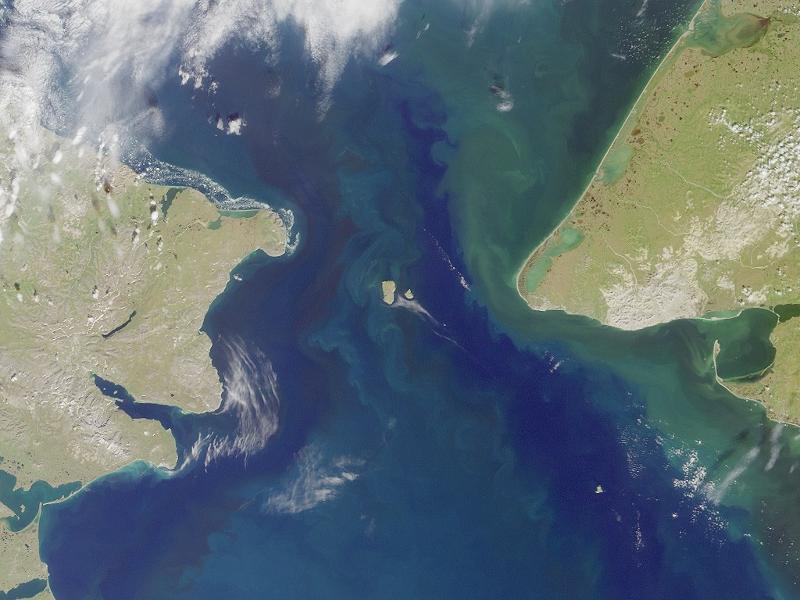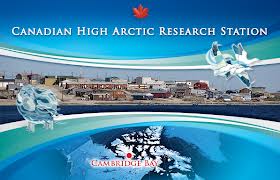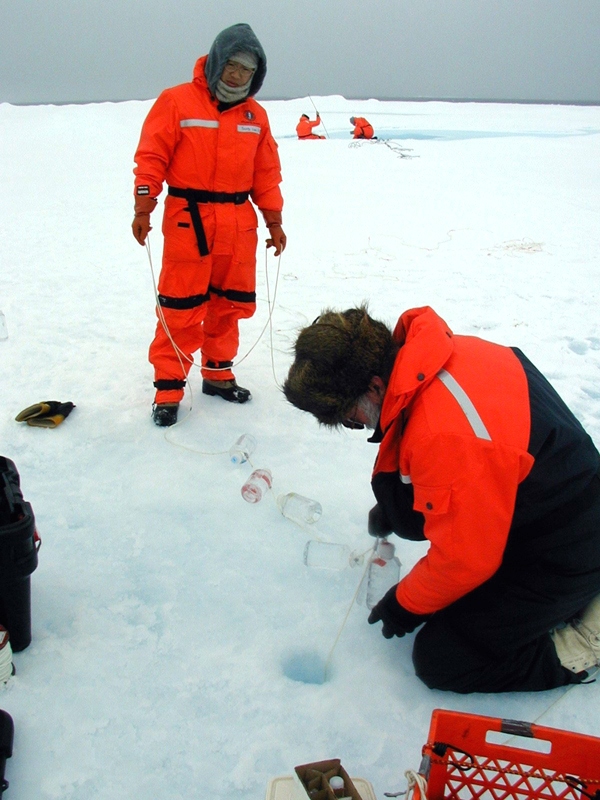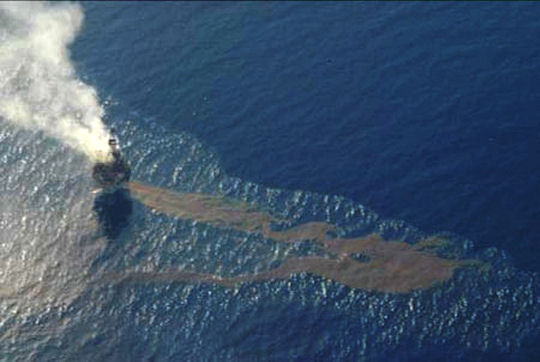|
|
|
|
|
|
|
|
No Arctic science events are planned for today.
|
Media
Military Shipyards Eye Stakes in Arctic LNG. Their order books are full of jobs for the Russian military, but the shipyards of Sevmash and Zvezdochka still want a piece of the major construction works related to upcoming Arctic LNG projects. According to Ilya Panteleev, a top representative of the United Shipbuilding Corporation, the two yards in Severodvinsk are currently in the process of training staff for the upcoming jobs. The Barents Observer
Russian Delegation Invites Finnish Legislators to Arctic Hearings - MP. A delegation of the Russian parliament's upper house (Federation Council) invited Finnish legislators, members of the foreign relations commission, to hearings on cooperation in the Arctic, planned for November, Head of the Federation Council's Committee Konstantin Kosachev told reporters after a three-day visit to Finland. According to him, the countries will "include actively into the dialogue issues of multilateral cooperation, including on the North, Arctic and the Baltic Regions." TASS
 UN Agency Approves Bering Strait Shipping Route. UN Agency Approves Bering Strait Shipping Route. The United Nations agency responsible for marine safety standards last week approved a set of two-way shipping routes through the Bering Strait. The routes were proposed to the International Maritime Organization in a joint effort by the United States and the Russian Federation. "Over the past decade, the U.S. and Russia have both observed a steady increase in Arctic shipping activity," wrote U.S. Coast Guard Navigation Standards Division Chief Mike Sollosi earlier this year, when the routes were being proposed. Brookville Times
 CHARS Unites Science, Technology With Inuit Knowledge. CHARS Unites Science, Technology With Inuit Knowledge. When the Montreal-based joint venture of EVOQ Architecture and NFOE was retained to design a research station in the Arctic, its mandate included integrating the facility into the local Inuit community. "This represented both a challenge and a welcome opportunity," says architect Alain Fournier, a founding partner in EVOQ, who leads his firm's projects north of the 55th parallel. Located in the hamlet of Cambridge Bay, Nunavut, the Canadian High Arctic Research Station (CHARS) brings science and technology and traditional Inuit knowledge under one roof. Daily Commercial News
 Fieldwork in the Arctic is Surprisingly Costly, Limiting the Research Done There. Fieldwork in the Arctic is Surprisingly Costly, Limiting the Research Done There. Mark Mallory, who has studied Arctic seabirds for more than 20 years, often notes in his scientific papers how expensive it is to conduct fieldwork in the far north, as have some of his colleagues. But when they recently tallied up their costs systematically, they were shocked to find the true price of northern research was eight times greater than for similar studies of seabirds in southern locations. The findings, reported on 4 June online in Arctic Science, are among the first to quantify the high costs of Arctic research. The authors say funding sources are often insufficient to cover these expenses, limiting scientists from collecting enough data to understand how Arctic ecosystems are responding to climate change. Science Magazine
|
|
Future Events
From Entering the Field to Taking the Helm, Women's Perspectives on Polar Research, June 20, 2018 (Kongresszentrum Davos, Switzerland). This event is hosted by ARCUS and co-sponsored by USARC. Research findings are shaping our understanding of the issues that women face in technical fields, particularly those with strong connections to fieldwork. Concerns include a deficit of female leadership due to the so-called "leaky pipeline," a lack of safety and inclusivity at field locations, and explorations of ways in which research agendas have discounted contributions of women. Despite historical barriers to participation in polar field work, women have made outstanding contributions to polar physical, biological and social sciences, as well as to community-level efforts to coordinate and communicate science. In the past decade, women have stepped into leadership roles at polar institutions. Yet evidence of persistent challenges, reflected both in academic studies and media reports, compels us to examine the sources of those challenges and to explore solutions to ensure a bright future for all those who wish to engage in polar research.
5th European Conference on Permafrost, June 23-July 1, 2018 (Chamonix-Mont Blanc, France). In the continuation of the International and Regional conferences convened by the International Permafrost Association, the 5th European Conference on Permafrost (EUCOP 2018) will be held in Chamonix-Mont Blanc, France, 23rd June - 1st July 2018. The conference aims at covering all relevant aspects of permafrost research, engineering and outreach on a global and regional level. Conference website: here.
Arctic Observing Summit 2018, June 24-26, 2018 (Davos, Switzerland). The Arctic Observing Summit (AOS) is a high-level biennial summit that provides a platform to address urgent and broadly recognized needs of Arctic observing across all components of the Arctic system. AOS 2018 will be held in Davos, Switzerland ( June 24-26) and will focus on pressing issues in the implementation and support of sustained observations that can be addressed through a business-case lens. To that end, short submissions are requested that address any and all aspects of the overarching theme and sub-themes. Additional information can be found here.
 Coastal Response Research Center Requests Input on the State of Science on Dispersant Use in the Arctic. The Coastal Response Research Center (CRRC) recently collected statements and reports on five topic areas related to dispersant use in the Arctic: efficacy and effectiveness; physical transport and chemical behavior; degradation and fate; eco-toxicity and sublethal impacts; and, public health and food safety. CRRC request written input on the statements the scientists made on the state-of-the-science regarding dispersant use, particularly as it applies to Arctic waters. Written comments are requested by July 13th. More information on this initiative is available here. Coastal Response Research Center Requests Input on the State of Science on Dispersant Use in the Arctic. The Coastal Response Research Center (CRRC) recently collected statements and reports on five topic areas related to dispersant use in the Arctic: efficacy and effectiveness; physical transport and chemical behavior; degradation and fate; eco-toxicity and sublethal impacts; and, public health and food safety. CRRC request written input on the statements the scientists made on the state-of-the-science regarding dispersant use, particularly as it applies to Arctic waters. Written comments are requested by July 13th. More information on this initiative is available here.
17th International Congress of Circumpolar Health (ICCH17), August 12-15, 2018 (Copenhagen, Denmark). The ICCH congresses are held every third year in different locations in the circumpolar area and represent the largest scientific meetings worldwide on circumpolar health. The ICCH congresses serve as the primary source of information exchange and scholarly communication in issues relating to circumpolar health. More than 750 participants generally register and participate in each Congress, and more than 400 scientific papers or posters are usually presented.
UArctic Congress 2018, September 3-7, 2018 (Oulu and Helsinki, Finland). The UArctic Congress 2018 will bring together key UArctic meetings and a science conference into one single gathering, including business meetings of the Council of UArctic, Rectors' Forum, Student Forum, and Thematic Networks & UArctic Institutes Leadership Team. The Congress is an integral part of the Finland's Arctic Council chairmanship program, and open to the public. The event will highlight the themes and priorities of the Finnish chairmanship, including the goals of the United Nations' 2030 Agenda for Sustainable Development, and the Paris Agreement under the UN Framework Convention on Climate Change.
Scientific Exploration of the Arctic and North Pacific (SEA-NorP), September 25-27, 2018 (Mt. Hood, Oregon USA). This workshop will include discussion of hypotheses that can be tested by scientific drilling in the region, the technology necessary to achieve those goals, ideal sites for drilling based on existing data, and where additional site survey data is needed. The goal of the workshop organizers is that multiple proposals will be initiated at the workshop, both for full cruise legs and for shorter, targeted expeditions around the following themes: ocean gateways, geohazards, volatile cycling, ice histories at transition zones, biosphere and climate.
The second Arctic Biodiversity Congress is hosted by the Conservation of Arctic Flora and Fauna (CAFF), the biodiversity working group of the Arctic Council, and the Ministry of the Environment, Finland. The second Arctic Biodiversity Congress will build on the success of the first Congress, held in 2014 in Trondheim, Norway, and will bring together scientists, policymakers government officials, Indigenous representatives, Traditional Knowledge holders, industry, non-governmental organizations, and others to promote the conservation and sustainable use of Arctic biodiversity.
|
|

  
4350 N. Fairfax Drive, Suite 510
Arlington, VA 22203, USA
External links in this publication, and on the USARC's World Wide Web site ( www.arctic.gov) do not constitute endorsement by the US Arctic Research Commission of external Web sites or the information, products or services contained therein. For other than authorized activities, the USARC does not exercise any editorial control over the information you may find at these locations. These links are provided consistent with the stated purpose of this newsletter and the USARC Web site.
|
|
|
|
|
|
|
|
|
 UN Agency Approves Bering Strait Shipping Route. The United Nations agency responsible for marine safety standards last week approved a set of two-way shipping routes through the Bering Strait. The routes were proposed to the International Maritime Organization in a joint effort by the United States and the Russian Federation. "Over the past decade, the U.S. and Russia have both observed a steady increase in Arctic shipping activity," wrote U.S. Coast Guard Navigation Standards Division Chief Mike Sollosi earlier this year, when the routes were being proposed. Brookville Times
UN Agency Approves Bering Strait Shipping Route. The United Nations agency responsible for marine safety standards last week approved a set of two-way shipping routes through the Bering Strait. The routes were proposed to the International Maritime Organization in a joint effort by the United States and the Russian Federation. "Over the past decade, the U.S. and Russia have both observed a steady increase in Arctic shipping activity," wrote U.S. Coast Guard Navigation Standards Division Chief Mike Sollosi earlier this year, when the routes were being proposed. Brookville Times CHARS Unites Science, Technology With Inuit Knowledge. When the Montreal-based joint venture of EVOQ Architecture and NFOE was retained to design a research station in the Arctic, its mandate included integrating the facility into the local Inuit community. "This represented both a challenge and a welcome opportunity," says architect Alain Fournier, a founding partner in EVOQ, who leads his firm's projects north of the 55th parallel. Located in the hamlet of Cambridge Bay, Nunavut, the Canadian High Arctic Research Station (CHARS) brings science and technology and traditional Inuit knowledge under one roof. Daily Commercial News
CHARS Unites Science, Technology With Inuit Knowledge. When the Montreal-based joint venture of EVOQ Architecture and NFOE was retained to design a research station in the Arctic, its mandate included integrating the facility into the local Inuit community. "This represented both a challenge and a welcome opportunity," says architect Alain Fournier, a founding partner in EVOQ, who leads his firm's projects north of the 55th parallel. Located in the hamlet of Cambridge Bay, Nunavut, the Canadian High Arctic Research Station (CHARS) brings science and technology and traditional Inuit knowledge under one roof. Daily Commercial News Fieldwork in the Arctic is Surprisingly Costly, Limiting the Research Done There. Mark Mallory, who has studied Arctic seabirds for more than 20 years, often notes in his scientific papers how expensive it is to conduct fieldwork in the far north, as have some of his colleagues. But when they recently tallied up their costs systematically, they were shocked to find the true price of northern research was eight times greater than for similar studies of seabirds in southern locations. The findings, reported on 4 June online in Arctic Science, are among the first to quantify the high costs of Arctic research. The authors say funding sources are often insufficient to cover these expenses, limiting scientists from collecting enough data to understand how Arctic ecosystems are responding to climate change. Science Magazine
Fieldwork in the Arctic is Surprisingly Costly, Limiting the Research Done There. Mark Mallory, who has studied Arctic seabirds for more than 20 years, often notes in his scientific papers how expensive it is to conduct fieldwork in the far north, as have some of his colleagues. But when they recently tallied up their costs systematically, they were shocked to find the true price of northern research was eight times greater than for similar studies of seabirds in southern locations. The findings, reported on 4 June online in Arctic Science, are among the first to quantify the high costs of Arctic research. The authors say funding sources are often insufficient to cover these expenses, limiting scientists from collecting enough data to understand how Arctic ecosystems are responding to climate change. Science Magazine

